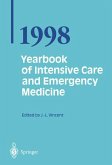For many years, intensive care has focused on avoiding immediate death from acute, life-threatening conditions. However, there are increasing reports of a number of lingering consequences for those who do indeed survive intensive care. Examples include on-going high risk of death, neurocognitive defects, significant caregiver burden, and continued high healthcare costs.
Surviving Intensive Care, written by the world's experts in this area, is dedicated to better understanding the consequences of surviving intensive care and is intended to provide a synopsis of the current knowledge and a stimulus for future research and improved care of the critically ill.
Hinweis: Dieser Artikel kann nur an eine deutsche Lieferadresse ausgeliefert werden.
Surviving Intensive Care, written by the world's experts in this area, is dedicated to better understanding the consequences of surviving intensive care and is intended to provide a synopsis of the current knowledge and a stimulus for future research and improved care of the critically ill.
Hinweis: Dieser Artikel kann nur an eine deutsche Lieferadresse ausgeliefert werden.
From the reviews:
"This sleek and modern-appearing paperback is a recent publication by Springer-Verlag, in the series Update in Intensive Care Medicine. ... Surviving Intensive Care has clear typography, high-quality paper, and a strong binding ... . The illustrations and tables ... are clear and generally informative. ... As a whole, Surviving Intensive Care is probably most of interest to clinical researchers interested in considering long-term outcomes as primary or secondary end points of observational or interventional research in the ICU." (Catherine Lee Hough, Respiratory Care, Vol. 50 (9), September, 2005)
"This sleek and modern-appearing paperback is a recent publication by Springer-Verlag, in the series Update in Intensive Care Medicine. ... Surviving Intensive Care has clear typography, high-quality paper, and a strong binding ... . The illustrations and tables ... are clear and generally informative. ... As a whole, Surviving Intensive Care is probably most of interest to clinical researchers interested in considering long-term outcomes as primary or secondary end points of observational or interventional research in the ICU." (Catherine Lee Hough, Respiratory Care, Vol. 50 (9), September, 2005)









